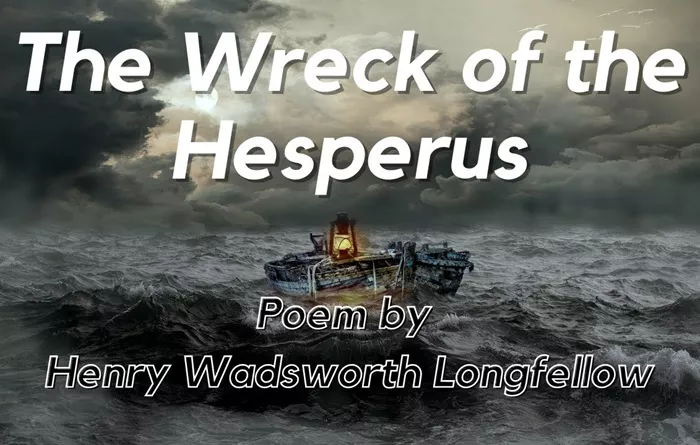Disasters, whether natural or man-made, have profoundly impacted human history and culture. Poets have long drawn upon such catastrophes to express grief, awe, and resilience, creating works that resonate across generations. From shipwrecks and earthquakes to wars and personal tragedies, these poems immortalize disasters while delving deep into the human condition. Below, we explore nine famous poems that capture the essence of disasters and their aftermath.
1. “The Wreck of the Hesperus” by Henry Wadsworth Longfellow
Henry Wadsworth Longfellow’s “The Wreck of the Hesperus” is a harrowing narrative poem about a shipwreck caused by a fierce storm. Written in 1842, it tells the story of a proud and overconfident captain who disregards warnings about the weather. He takes his young daughter aboard the Hesperus, a schooner, but the storm proves too powerful.
The captain ties his daughter to the mast to keep her safe, but the ship is wrecked, and both perish. Longfellow’s evocative imagery and rhythmic style emphasize the overwhelming power of nature and the tragedy of human hubris.
“The breakers were right beneath her bows,
She drifted a dreary wreck,
And a whooping billow swept the crew
Like icicles from her deck.”
This poem serves as a stark reminder of humanity’s vulnerability in the face of natural disasters.
2. “Fire and Ice” by Robert Frost
In Robert Frost’s short yet powerful poem “Fire and Ice”, the poet contemplates the potential end of the world. Written in 1920, it reflects on the dual destructive forces of fire and ice, symbolizing desire and hatred. Frost’s lines succinctly capture the essence of human-driven disasters and their potential to devastate the planet.
“Some say the world will end in fire,
Some say in ice.
From what I’ve tasted of desire
I hold with those who favor fire.”
Though brief, the poem’s profound meditation on destruction resonates with modern anxieties about climate change and global conflicts, making it timelessly relevant.
3. “Dulce et Decorum Est” by Wilfred Owen
Wilfred Owen’s “Dulce et Decorum Est” is one of the most vivid portrayals of the horrors of war. Written during World War I, the poem describes a gas attack on soldiers. Owen’s graphic imagery and unflinching depiction of suffering challenge the romanticized notions of war.
“Gas! GAS! Quick, boys! – An ecstasy of fumbling,
Fitting the clumsy helmets just in time;
But someone still was yelling out and stumbling,
And flound’ring like a man in fire or lime.”
The poem critiques the idea that dying for one’s country is glorious, highlighting the disaster of war and its brutal impact on individuals.
4. “The Convergence of the Twain” by Thomas Hardy
Thomas Hardy wrote “The Convergence of the Twain” as a response to the sinking of the Titanic in 1912. The poem contrasts the grandeur of the ship with its tragic fate, emphasizing themes of human pride and the indifferent power of nature.
“And as the smart ship grew
In stature, grace, and hue,
In shadowy silent distance grew the Iceberg too.”
Hardy’s detached tone underscores the inevitability of disaster, portraying the collision of the Titanic and the iceberg as a predestined event. The poem explores the fragility of human ambition in the face of cosmic forces.
5. “London” by William Blake
William Blake’s “London” is not about a single disaster but an ongoing one—the suffering caused by social inequality and industrialization. Written in 1794, the poem paints a bleak picture of the city, with references to poverty, disease, and oppression.
“In every cry of every Man,
In every Infant’s cry of fear,
In every voice, in every ban,
The mind-forged manacles I hear.”
Blake’s powerful critique of societal ills reveals the silent disasters unfolding in urban life, where human suffering is a daily occurrence.
6. “September 1, 1939” by W.H. Auden
W.H. Auden’s “September 1, 1939” was written on the eve of World War II. The poem reflects on the human failings that led to the conflict, blending personal reflection with commentary on global disasters. Auden grapples with themes of fear, responsibility, and the hope for redemption.
“We must love one another or die.”
The poem captures the dread and uncertainty of a world on the brink of disaster, resonating deeply with those living through turbulent times.
7. “After the Flood” by Louise Glück
Louise Glück’s “After the Flood” delves into the aftermath of a natural disaster, exploring themes of loss and survival. Glück uses sparse, evocative language to depict a world forever changed by calamity.
“What is left after a flood
But the memory of damage done?”
This modern poem reflects on humanity’s struggle to rebuild and find meaning in the wake of destruction, making it a poignant meditation on resilience.
8. “Pompeii” by Edwin Brock
Edwin Brock’s “Pompeii” reflects on the volcanic eruption that destroyed the ancient city of Pompeii in 79 AD. Through vivid imagery, Brock captures the suddenness of the disaster and the enduring silence that followed.
“The air thickened like glass,
And time froze in its grasp.”
The poem explores the fragility of life and the power of nature, emphasizing how history preserves the memory of catastrophic events.
9. “Hurricane” by Mary Oliver
Mary Oliver’s “Hurricane” is a lyrical exploration of the destructive force of storms. The poet uses the hurricane as a metaphor for emotional upheaval and transformation.
“It didn’t behave
like anything you had ever imagined.
The wind tore at the trees, the rain
fell for days slant and hard.”
Oliver’s work portrays both the violence of disasters and their potential to bring renewal, showing how destruction can lead to growth.
Conclusion
These nine poems offer powerful insights into disasters, reflecting on their causes, impacts, and meanings. Whether portraying natural calamities, societal breakdowns, or personal losses, these works capture the profound truths of human experience. They remind us of our shared vulnerability and resilience, urging us to confront disaster with courage and understanding. Through their timeless words, these poets ensure that the lessons of the past remain vivid for generations to come.

